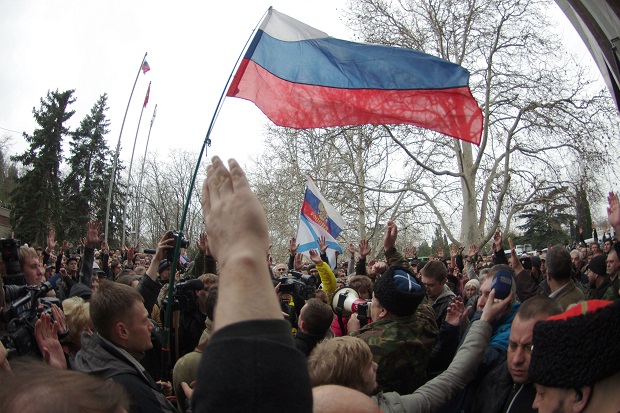Perhaps it’s premature to say this now that the Russian prime minister, Dmitry Medvedev, has sounded off about Russian citizens in Ukraine being in danger, but it strikes me that Russia has behaved in the current crisis with a certain commendable restraint.
Judging from most pundits in most British papers, there is no redeeming element to the Putin regime – soup to nuts, gay rights to corruption – and if it hasn’t actually sent the tanks in, well, it probably wants to.
Yet, reading the statement from its foreign ministry that ‘a forced change of power is underway’, it’s hard to say that it’s not strictly correct. Mr Medvedev wasn’t actually being untruthful in saying that: ‘the legitimacy of a whole number of organs of power that function [in Kiev] raises great doubts. Some of our foreign, Western partners think otherwise. This is some kind of aberration of perception when people call legitimate what is essentially the result of armed mutiny. We do not understand what is going on there. There is a real threat to our interests and to the lives of our citizens.’
From the Russian perspective that’s a reasonable point of view. Viktor Yanukovych isn’t our kind of president and seems undeniably to have authorised the security services to use snipers against civilians, but when it comes to a description of what happened in Kiev in the last few days, armed mutiny is not an unreasonable way of putting it – though it must be said, there were more arms with the government than the opposition. Mr Yanukovytch was indeed a legitimately elected president; the opposition which is now running the show with the support of the EU is not, and won’t have the chance to be until elections take place in May. For parliament to issue a warrant for the ex-president’s arrest is not, in the circumstances, a conciliatory move, though it is a natural one.
Russia does indeed have a legitimate interest in the region because of the numbers of Ukrainians who identify with it rather than the EU and, for good measure, speak Russian as a first language. We may think they’re on the wrong side of history or just plain wrong, but it’s a bit rash to try to project sentiment in Kiev onto the rest of the country – in the Crimea (and it’s wonderful how resonant of history the placenames are – Mr Yanukovytch is said to be roosting in Balaklava) they take a different view, and if they don’t identify with the protesters in Kiev as enthusiastically as we might like them to, well, that’s their call.
It seems very probable that the EU will be the winner in this fight, and if there isn’t to be partition – never a good option – Russia will lose control over an important strategic area. Yet so far, the Putin government has behaved, as I say, with remarkable restraint other than the use of strong language on Russian speaking media outlets in the east. In the old days, they’d have sent the tanks in about a week ago. Is it possible, with all due caution, for us to say so, even though this runs counter to the pundit orthodoxy on the subject of Putin’s Russia?
Incidentally, although I naturally applaud the EU supporting Ukraine, and indeed Ukraine embracing the EU if it wants to, we should perhaps take on board the implications. If the country does indeed join the EEA and ultimately the Union, its 45 million citizens will have the right to live and work freely throughout the EU. Including here. Just saying. But at least, unlike Turkey, Ukraine is actually European.







Comments